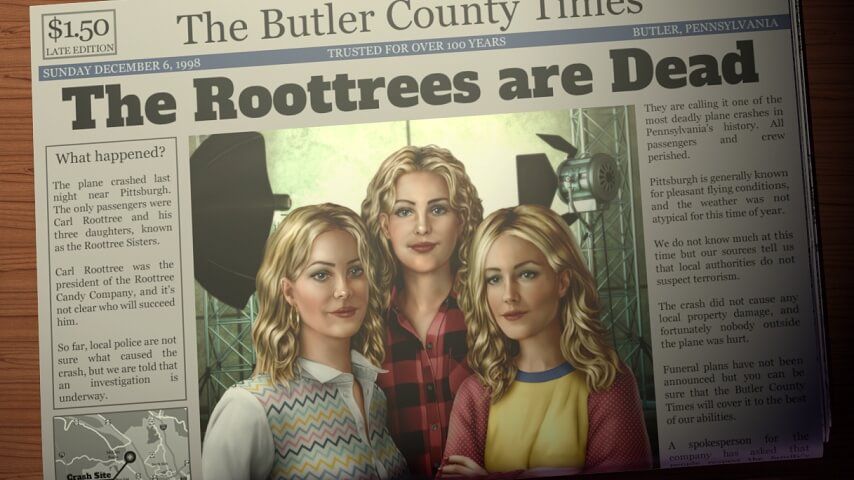One of our favorite games of 2023 just got a gorgeous new version
The new version of indie detective masterpiece The Roottrees Are Dead is even better than the already excellent original.
Screenshot: The Roottrees Are Dead
Back in December of 2023—clued in by some of my fellow detective game nerds, who share my exhaustive hunger for games that scratch the mystery-solving itch in more complex or compelling ways than “Pick the right dialogue option at the end of a side quest that feeds you all the “clues”—I wrote a column about indie game The Roottrees Are Dead. Even at the time, Jeremy Johnston’s itch.io offering was a remarkably polished effort: Clearly inspired by Lucas Pope’s Return Of The Obra Dinn (which has kicked off a whole welcome little sub-genre of note-taking investigation games), the game got a ton of mileage out of a simple structure: Completing the family tree of fictitious candy company magnates The Roottrees, whose most prominent members have just abruptly died in a plane crash.
With the conceit that you’re doing all this detective work in the late ’90s, when online archives and search engines were less robust or useful—and god, but does that feel like a bit of “same as it ever was” in the increasingly garbage-choked internet of 2025—Johnston’s game was a shockingly compelling, funny, lively mystery, with lots of clever ways to hide information about who was married to who, who was born in what order, and what mysteries were possibly lurking in these people’s pasts. I spent a couple of joyful nights with the game back in 2023, wrote up some thoughts on it, and made a mental note to keep track of whatever Johnston ended up doing next.
Which turns out to have been an even better version of The Roottrees Are Dead, in collaboration with designer Robin Ward, which arrived on Steam this week. And after spending several hours with the new edition, I’m comfortable saying it’s a remarkable improvement on what was already one of the best recent games I’ve played. Obvious changes include the hiring of artist Henning Ludvigson to provide the game’s images, replacing the AI-generated pictures that illustrated the original game with well-crafted portraits and family photos. (Besides the obvious benefits of giving the game a human-crafted visual identity, this change impacts the gameplay, since it’s now much easier to draw links between the game’s various photographs due to family resemblances, or to track one person across the eras.) Ward, who’s credited with the game design, working from Johnston’s original, has done a great job of giving a physical weight to your unseen character’s movements between their evidence table, their corkboard of names, pictures, and job titles, and the clunky little computer where you do most of your research: By placing all of these objects inside a lightly sketched, but effective, living room setting, Roottrees feels less like you’re clicking between various forms, and more like it’s a real search.
Maybe most importantly (if also most difficult to pin down), the new version of Roottrees simply has a better feel to it than what I got while clicking around in an itch.io window a few years back. Looking back at the old version, it’s perfectly functional, but also bears many of the barebones hallmarks of a game more interested in its ideas than its presentation: The fake websites look a little more sketchy, the typing feels a little off, etc. The new interface tweaks—including blessed quality-of-life features like an in-game notebook you can send notes to by highlighting text, and a search history for your online queries—do exactly what any truly great remaster should: Make it easier to experience the genius of what was already there, letting the game get out of its own way. After telling myself I was just going to dip into the game a few nights back for a bit to see how different this new version was, I couldn’t help but be seduced by Johnston’s deftly crafted mystery all over again: The ability to follow different threads down the rabbit holes of family history, lost books, secret feuds, and more is still incredibly addictive, and now it has far fewer little impediments to letting you get lost in all this maple-flavored family drama. That’s even before getting into the expansion chapter that was added for the new release, which tells an even twistier case, and pushes clue-finding and deduction to their limits.
So, yeah: The Roottrees Are Dead was one of the easiest recommendations I’ve ever made in my games writing career the first time around; its revamped version is even better, without sacrificing any of the magic of the original.